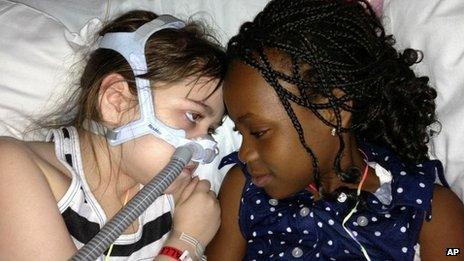Judge moves Sarah Murnaghan onto adult lung list
- Published

A US federal judge has allowed a severely-ill 10-year-old girl a prime spot on the list to receive an adult lung transplant, despite her young age.
Sarah Murnaghan has been in hospital for three months with end-stage cystic fibrosis, but children under 12 are given last priority for adult lungs.
The Obama administration had declined to intervene. Analysts warn the judge's decision sets a dangerous precedent.
The judge's order does not guarantee a lung for Sarah.
"We are beyond thrilled,'' Janet Murnaghan, the girl's mother, told the Associated Press. "Obviously we still need a match.''
Some medical analysts say the judge's intervention creates a dangerous precedent for others on organ transplant lists.
'The very top'
"I'm not sure I want judges or congressmen or bureaucrats trying to decide what to do with organs at the bedside," said Dr Arthur Caplan, a bioethicist at New York University Langone Medical Center.
Dr Caplan said children fare worse than adults after lung transplants, one of the reasons for the existing policy.
On Wednesday, US District Judge Michael Baylson issued a temporary restraining order barring the US health and human services department from applying to Sarah the rule that keeps children under 12 "at the back of the line" for adult lungs.
Sarah Murnaghan was diagnosed with cystic fibrosis when she was 18 months old. She had been in and out of hospital since then, but until 18 months ago she attended school and led a relatively normal life, her family has written in court documents.
At that point, her condition deteriorated considerably, diminishing her lung capacity to 30%, according to a court filing by the girl's aunt, Sharon Ruddock.
Two weeks ago, she was admitted to the intensive care unit in hospital.
Doctors have told the Murnaghans that if Sarah were an adult, she would likely be at "the very top" of the lung transplant list.
But the "under-12" rule only gives her priority for the far smaller pool of paediatric lung donations, in part because all lung donations must fit the recipient's body.
If Sarah were to receive a lung from a larger donor, doctors could "downsize the donor lungs" to fit, Ms Ruddock said. While such a move "may be a complicating factor", Sarah's condition was grave enough to consider it.
Joel Newman, spokesman for the United Network for Organ Sharing, which operates the nation's transplant network, said he was unaware of any previous court order that overruled a transplant policy.
'Agonising situation'
While some lungs donated from deceased adults have been offered for children's transplants over the past two years, Mr Newman said, all were turned down by the children's surgeons.
Meanwhile, the Murnaghans are hoping the 10-day temporary order would allow for a more lasting change.
A lawyer for the family said a committee of the organisation that sets transplant policy may meet next week and he hoped it would change the rule.
"I hope that they decide to discontinue it completely for children under 12," Steve Harvey said. "I won't be satisfied until Sarah Murnaghan receives a set of lungs."
Health and Human Services Secretary Kathleen Sebelius said last week that while Sarah's case was an "incredibly agonising situation" she would not intervene, saying it should be the decision of medical experts.
"I would suggest that the rules that are in place and are reviewed on a regular basis are there because the worst of all worlds, in my mind, is to have some individual pick and choose who lives and who dies," Ms Sebelius said.